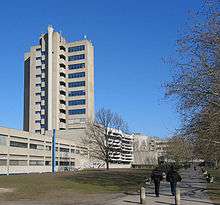Beuth University of Applied Sciences Berlin
The Beuth University of Applied Sciences Berlin (German Beuth Hochschule für Technik Berlin) also: Beuth Hochschule or BHT Berlin (formerly known as Technische Fachhochschule Berlin or TFH Berlin) is the second largest University of Applied Sciences in Berlin, Germany. There are around 12,000 students studying at BHT in more than 70 majors and 795 employees, under which there are 291 professors and 43 guest lecturers.[1]
Beuth Hochschule für Technik Berlin | |
 | |
| Motto | Studiere Zukunft (German) |
|---|---|
Motto in English | Study the future |
| Type | Public |
| Established | 1823/1971 |
| Endowment | 84,4 Mio. € |
| President | Monika Gross |
Academic staff | 291[1] |
Administrative staff | 795[1] |
| Students | 12,013 (WS 2013/14)[1] |
| Address | Beuth University of Applied Sciences , , Luxemburger Str. 10 13353 52°32′39″N 13°21′10″E |
| Campus | Urban |
| Website | www |
History
The BHT traces its roots back to the establishment of the Royal Academy for Gardening (German Königliche Gärtner-Lehranstalt) in 1823.[2][3] In 1878 it was expanded into the Academy of Architectural Engineering followed and then into the Erste Handwerkerschule Berlin in 1878. Two years later the First School of Skilled Manual Workers Berlin[3] was established as a university of applied sciences for carpenters and bricklayers.[3]
In 1909 the Beuth Academy for Engineering Berlin was established. Followed by several smaller institutes and academies across the metropolitan area such as the Baugewerkschule Neukölln in 1919 and the School of Engineering the institution was upgraded amongst the years.
The present university of applied sciences called Technische Fachhochschule Berlin was established in 1971[3] when several faculties such as food technology were also integrated. Those faculties have since then been accommodated at the new campus at the Luxemburger Straße in Berlin. On January 17, 2008, the academic general assembly decided to change the name of the institution into Beuth Hochschule für Technik Berlin starting in 2009.[3][4][5] The new name refers to Christian Peter Wilhelm Beuth, a former Prussian ministry representative who is being considered to be the spiritual father of engineering training in Germany because he was in charge of establishing the Technisches Institut in Berlin in 1821.[6][7]
Faculties

The Beuth Hochschule is divided into several departments instead of faculties like general public universities. Currently there are eight departments[8] with up to nine study courses.
The BHT is the first educational institution in Germany that offers its students to pursue a Bachelor or Master degree. It is also the only public institution in Germany that offers people to study theater engineering and event technology and management.
Educational partnerships
The BHT maintains a co-operative programme featuring national companies such as the Deutsche Bahn, Burger King, the Berlin promotion agency and Audi. The programme enables students to gain practical work experience via a co-operative education programme on-the-job.[9]
International exchange programs
There are over 20 universities and educational institutions that hold student exchange programs with the BHT in Europe under "the Erasmus Partnerships" program, and the Partnerships worldwide for global network. To name a few, in the EU the Hogeschool Gent (HoGent) - University College Ghent in Belgium, the University of Food Technologies in Bulgaria, Copenhagen School of Design and Technology (KEA) in Denmark, Helsinki Metropolia in Finland, École Nationale Supérieure Agronomique de Toulouse in France, Hellenic Open University in Greece, Politecnico di Milano in Italy, Adam Mickiewicz University in Poland, and Glasgow Caledonian University in the UK. It is also a member of the Ge4, or Global Education: Exchanges for Engineers and Entrepreneurs, an independent non-profit network of universities established in 1996 for the purpose of connecting global industry and academic institutions.[10]
Athletics
The BHT maintains a very famous institute for collegiate sports.[11] It is also famous for being the Olympic Support Centre of Berlin. The faculties include a training centre for public security guards.
Notable academic staff
- Stephan Braunfels (born 1950), German architect
Notable people
- Hartmut Mehdorn (born 1942), German manager and former chairman of the board of the German Railway company
- Boris Floricic (1972–1998 in Berlin) was a German hacker and developer of the cryptophon
Memberships
- Studentische Darlehnskasse e.V.
See also
References
- "BHT Facts and Figures". BHT. Retrieved 28 May 2014.
- "Geschichte" (in German). Beuth Hochschule für Technik Berlin – University of Applied Sciences. Retrieved 26 July 2017.
- "Beuth Präsentation — Historical Roots of Beuth Hochschule". Beuth Hochschule für Technik Berlin – University of Applied Sciences. p. 3. Retrieved 25 July 2017.
- "Startseite: Beuth Hochschule für Technik Berlin". Retrieved 29 June 2015.
- "Berlin act for consolidation of the universities of applied sciences" (PDF). Archived from the original (PDF) on 2013-12-16. Retrieved 2012-11-24.
- "Christian Peter Wilhelm Beuth" (in German). Retrieved 29 June 2015.
- "About us". Beuth Hochschule für Technik Berlin. Retrieved 2017-07-26.
- "Beuth Präsentation — Departments". Beuth Hochschule für Technik Berlin – University of Applied Sciences. p. 6. Retrieved 25 July 2017.
- Beuth Hochschule für Technik Berlin, Studiengang Betriebswirtschaftslehre (Dual, B.A.). "Studiengang Betriebswirtschaftslehre (Dual, B.A.) - Kooperationspartner - Beuth Hochschule für Technik Berlin". Retrieved 29 June 2015.CS1 maint: uses authors parameter (link)
- "Universities Portal". Ge4 Network. Retrieved 26 July 2017.
- "Study at Beuth". Retrieved 26 July 2017.